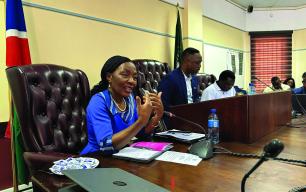Land bill to protect Namibians

By Erasmus Shalihaxwe
Independent Patriots for Change (IPC) Immanuel Nashinge, said land was the reason why some Namibians took up arms and gave their lives for independence. Thus, the newly introduced land bill should betray the sacrifices of those who died for the country in the war.
Nashinge made these remarks in parliament this week during the debate on the land bill which has been tabled by Minister of Agriculture, Fisheries, Water and Land Reform Inge Zaamwani.
The bill aims to overhaul land management by creating a more coherent legal framework for both communal and commercial land, replacing the "willing buyer-willing seller" model and granting the government new powers to acquire land in the public interest. It will provide for the establishment of communal land boards, creating a Land Acquisition and Development Fund, and prohibiting foreign nationals from acquiring communal and commercial land among others.
Nashinge said, said if left unamended, the bill risks centralising power, perpetuating inequality and undermining communities. But if shaped properly, it can fulfill the promise of the 2018 National Land Conference, deliver equitable access, strengthen governance and empower all Namibians.
‘’Land was the reason our parents and grandparents took up arms and gave their lives for independence. They fought and died so that Namibians would have access to land, dignity and opportunity. This Land Bill must not betray their sacrifices. Let us pass a Land Bill that finally honours the blood, sweat and vision of our forebears, a Bill that makes land a source of justice, empowerment and unity. Let us build a Namibia where land is truly for the people, for all its citizens and for generations to come,’’ said the Nashinge.
The official opposition leader in parliament expressed that one of the most troubling realities the Bill perpetuates is the disparity between communal and commercial land. A dualism that is not accidental but one of the last visible shadow of apartheid land administration. Even though the 2018 National Land Conference specifically resolved that ‘’land reform must eliminate dualism in land tenure systems" and that "all land should be managed equitably and sustainably regardless of classification."
He stressed that the bill treats communal land as if it were a lesser category managed by traditional authorities assumed to lack education or capability, while commercial land is handled under modern, professional standards.
‘’This thinking is feudalistic and discriminatory. If the law demands professionalism, sustainability and accountability in the management of commercial land, the same standards must apply to communal land supported through training, resources and institutional strengthening. We cannot continue to label communal farmers as incapable while offering no capacity-building.
Equal rights and responsibilities over land are not optional; they are central to the justice for which our parents fought and for which so many lives were sacrificed,’’ alluded Nashinge.
He added that section 6, sub-section (6) in the new bill gives the minister the power to appoint members of communal land boards after consultation with traditional authorities. However, consultation without shared authority is not partnership, but tokenism. Ignoring the 2018 Land Conference, which resolved that decentralisation must be strengthened, with regional and local participation in all land decisions.
‘’This Bill, instead, centralises power in the hands of the Minister. It sidelines the very communities the boards are meant to represent. For these boards to function effectively, appointments must be jointly made between the minister and traditional authorities, ensuring inclusivity, accountability and community ownership.
They must reflect gender balance, youth inclusion and regional diversity. These boards should not be mere administrative extensions of the ministry; they must be true custodians of community interests,’’ he advised.
He further recommended that the bill should clarify whether individuals can apply for communal land through registered companies, juristic persons, or cooperative bodies, rather than solely in their personal names, as the promotion of commercial land often requires collective and cooperative approaches. An approach that aligns with the resolutions of the Second National Land Conference of October 2018, which emphasised promoting commercial and investment activities on communal land to drive economic empowerment.
‘’This Bill centralises excessive power in the minister; appointments, disputes to appeals, a total contradiction to 2018 resolution calling for independent and transparent land dispute resolution mechanisms. Disputes over land must be adjudicated by neutral tribunals, not a tribunal set by political appointees, we can even establish a Land Ombudsman to address disputes and ensure fair practices. Decision- makers must also declare conflicts of interest and all processes must be transparent,’’ added Nashinge.
- 334 views










Comments